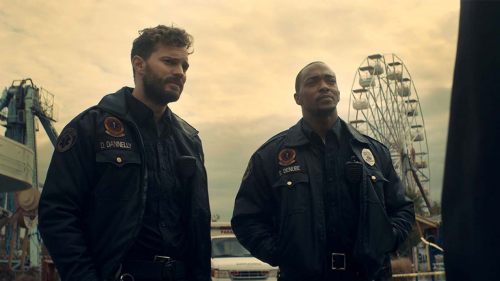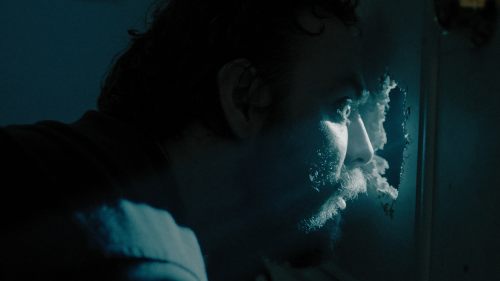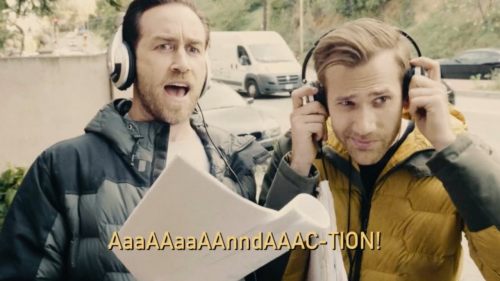Exploring THE ENDLESS With Filmmakers Justin Benson & Aaron Moorhead
Indie filmmakers Justin Benson and Aaron Moorhead exploded onto the scene when their 2012 film Resolution (about an intervention that veers off into the Twilight Zone) debuted at the Tribeca Film Festival. Their sophomore effort Spring (about a man in love with a she-creature) also took the festival circuit by storm in 2014, followed by another successful Tribeca launch, The Endless, in 2017. That film, about two brothers (played by Benson and Moorhead themselves) who return to a cosmic cult they escaped in their youth, opens from Well Go USA in NY April 6 and LA a week later, before expanding further.
In this exclusive interview, multi-hyphenates Benson (writer, co-editor and co-director) and Moorhead (co-director, FX creator and cinematographer) discuss the various cosmic conundrums offered by The Endless and their offbeat genre approach.
Q: Is this movie one big Rorschach test for the audience to decipher?
AARON MOORHEAD: The movie is a mystery. If you had to slap any single genre on it, the easiest one is mystery, purely by plot. As storytellers, if you end your mystery with a question mark, then you really didn’t give your audience a satisfying mystery. The answers to the film are in the film, but they are buried very, very deep. And whether it takes one or five viewings, as long as you’re satisfied by the emotional resolution at the end, we’re satisfied as storytellers.
JUSTIN BENSON: Something we noticed as were testing the script with groups of people: no matter what the level of comprehension of the story’s science-fiction aspects, the emotional aspect of the two brothers was always full comprehension. They are transformed in the end, and their relationship is different and better now. As long as you got that and it felt honest and didn’t feel melodramatic, that ending is a very small gesture that says everything about the transformation of their relationship. No matter how we end our movies and no matter what information is available, people always feel that there is something left to think about, especially in terms of the mystery. And that’s fun.
AM: Mysteries sometimes lose rewatch value because once you know what’s going on, everything becomes transparent. But The Endless has seeded a very, very, very deep lived-in mythology that, moment by moment as you’re watching, you can pick up a whole bunch of little things. That’s why this movie took us so long to make; it’s been haunting us since Resolution. And even before that, because Spring was a piece of The Endless. This movie has a very lived-in mythology. My parents called me after seeing it for the third time and said, “I totally missed that this person was that person!” Ideally, some people will connect all those threads so the movie will all come together in the end…or not. But there is one singular answer to all the great questions.
Q: Is the Resolution tie-in something you wanted to keep as a surprise?
JB: Resolution is a movie we love and is beloved by the people who saw it, but when you consider the number of people who did see it, it is .000001 percent of the population. That movie and that world inspired us to tell the best story we could with The Endless, and we loved paying tribute to that. And if you’ve seen Resolution, you will love that intersection and getting to see those characters again and all the little pieces of that mythology sprinkled throughout The Endless. That said, we were very careful that you didn’t need to see Resolution to enjoy this movie. They are separate films. We didn’t want people to think we did something insular and esoteric. We were careful not to do that.
AM: Nobody is going to see a sequel to a movie they didn’t see in the first place. So this never was and never will be a sequel to Resolution, but we love that these two movies exist in the same universe, and that universe still exists even outside this movie and can be even bigger.
Q: With all the hats you wore on this film—directing, writing, visual FX, etc.—what made you guys choose to star in it too?
AM: Arrogance [laughs]. After Spring, a lot of doors opened up for us and we have a number of larger projects to do, but they were moving at a lumbering speed. And we were getting antsy and we needed to go make something with our hands, low-budget, maybe using our iPhones… nothing could stop us. The only limitation that could stop us was our need for sleep. That was the conceit of the movie. And if we are in it, nobody can stop us from making it. We are always together, we can figure things out, rehearse ourselves to death. That was a very practical decision. But once we started talking about what we wanted the movie to be about, it was about anti-conformity and stopping history from repeating itself. There was that big science fiction idea that came out of the movie, and the smaller idea of the cult aspect of that same exact theme. But in a microcosm, that theme is brotherhood. So in that brotherhood, we felt we could speak to that very, very well. We also wanted to cast ourselves because we could really get behind the movie’s nonconformity aspect very personally. When the movie got bigger and bigger and we dropped the idea of shooting it on our iPhones as fast as we could, the decision to cast ourselves didn’t change.
Q: Was it a challenge adding that to your workload?
JB: It was a little bit different. I didn’t feel the extra work at all, just that I knew the movie differently. You memorize the lines, figure out the contextual analysis, the arc of your character, what you have in your toolbox of emotions. Instead of communicating all that to an actor, I was just doing it myself. For me, it was easier, but for Aaron, it was another level of difficulty he had to deal with, as he was also the director of photography. For him. it was another level of filmmaking organic chemistry: looking at the monitor, trying to light himself and perform at the same time. I had to admire Aaron for that.
AM: For me, it felt very organic and natural. Instead of saying “Action!” from behind the camera, you say it from in front. And it works. It was harder by proxy having one more hat, but it felt nice.
JB: During the month of rehearsal, we learned so many little things from the other amazing actors that were so important to us as performers.
AM: Directing talented actors is better than any acting class. To see what they do and why they do it.
Q: This is such an audacious and unclassifiable film. What were the typical reactions when you shopped it around to investors?
JB: The scripts that I write and Aaron and I develop together and ultimately go off and make as movies, they are impossible to get made. Both Resolution and Spring were self-financed. Somehow, The Endless immediately had three or four offers! I can’t explain that. It was the first time we had people who wanted to invest in one of our movies.
AM: Our financiers had strong enough imaginations to visualize Justin’s words and connect them to the final thing.
Q: How did you get the film financed?
AM: Justin wrote an article on the struggles of film financing for the Horror SubReddit website, and someone contacted us through that and told us about their film fund and wanting to work with us. The script was sent on Friday and the money was in the bank on Monday! The producers [Thomas Burke, Leal Naim and Frederick and Robert Pfaff], who had never made a film before, were amazing collaborators and gave us total control. They even played extras.
Q: How did you define the film for them?
JB: Genre is always hard to define for our movies. On this, the marketing department would definitely default to science fiction. Spring was marketed as horror romance, but was also science fiction. Horror movies don’t have to be scary. Some are meant to be funny. This was the scariest movie we’ve ever made, the most “uneasy.”
AM: Did we try to make moments scary? Yes. We’ve heard from people who’ve said they were still shaking after watching it. It pains people on a very primordial level because of the conceptual terror, the cosmic horror of Lovecraft. How infinite is the universe and what if it comes after you? As a filmmaker trying to evoke emotions, there’s no bigger compliment than that.
Q: How did the budget compare to your first two films?
JB: All we can say is that it was closer to Spring than Resolution.
AM: We shot it in 17 days. It was pretty quick.
Q: You guys are making truly unique genre films. Is it your goal to continue to defy expectation?
JB: Creating new mythologies and being innovative is something we want to stubbornly stick to, even though there is a lot of market resistance to that. We want to continue to be innovative and different. It’s not like we start a project and say, “Let’s be innovative and different.” We just want to be able to have authorship and do things that excite us.
Q: Lost seems to have been an inspiration.
AM: We’ve gotten that a lot. There’s no greater compliment. We are pretty business-savvy in our own right, and tried to describe the film as, “This meets This.” And we were at a loss. The movie’s not like some weird art film. You can watch it and know what it is, but what is it like? And Lost is a very good compliment.
Q: Aaron, you also have a visual FX credit on the film.
AM: I was the project lead and was able to get a couple of other people for a couple of weeks to help out immensely, including Michael Matzur on design and Erica Chan on compositing. It was sitting down and just grinding it. There are a lot of visual effects in the movie, about twice as many as you think. It was a massive undertaking that was fun to start with. I see visual effects as a bit of a release. With directing, there are a lot of different paths you can take and you can do it wrong. With visual effects, you know what the shot needs to be and you need to accomplish that shot and make it look real. You have a single end goal. It was very comfortable; you just work on it ’til it works. The only uncomfortable part was the design, like the end sequence, which could have been anything. And that’s where we had Michael Matzur come in and use his brilliant brain to figure it out from a story level. It was exhausting, but more comfortable than directing.
Q: Did you ever want to show the “monster”?
JB: Even when filmmakers have $200 million, they can still get it wrong. The plan was always just to show the result of the monster. That’s what the story called for too, and exploring the unknown. It would have violated the story’s overarching theme of fear. Someday, when another H.R. Giger comes along, we would be totally open to it. We don’t want to do it poorly or violate the movie we’ve set up.
Q: Your film doesn’t necessarily take a negative viewpoint on cults.
JB: There are so many wonderful documentaries and movies on the horrors of cults, and we used that expectation that people would think it’s going to be in our film, like a Jim Jones or Heaven’s Gate thing. We wanted to ask bigger questions and make people feel uneasy.
AM: The movie’s really not about cults at all. That will get you in, but at a certain point you realize that this really isn’t about them coming back to a cult but everything to do with this other thing going on. It expands into a much bigger thought of, do you or don’t you want to conform? We tried to take a neutral view because we didn’t want to sound moralizing on a question that is very complicated. There are upsides and we wanted it to seem there’s a choice. Nothing in the film, unlike other past cult movies, is particularly worrisome.
Q: What’s next for you both? Will you finish the trilogy?
AM: There’s no plans for a third movie. The story’s not done yet, and the book isn’t closed. Maybe a TV show would do well.
JB: We can’t give specifics, but we have three TV shows in development. We have plenty of stuff mapped out. The Endless could be the basis of one of them. They are all very much in our voice, which is probably better suited to television than movies.
Q: Why is that?
JB: Because we are so focused on character. The impact of our movies comes from getting to know the people, and TV just gives you more time to do that. TV is a better place for risky, left-of-center storytelling. That said, we also have three or four movies written, oftentimes just waiting for cast. Since Resolution, we have six screenplays waiting to be made. All science fiction/horror. No romantic comedies.
Q: You have been festival and critical darlings. Have the big studios come calling?
JB: Yeah. We’re kind of funny and hypocritical. We’ve had people ask us, “You guys wanna do something bigger?” and we’re like, “Yeah! Let’s make some compromises. Give us that script.” And then we read the scripts, and it’s, “No, can’t do it.” And it’s not because it’s terrible. It’s the difference between a custom-made suit that we can make ourselves and is just right and trying to grab something off the rack that oftentimes, “You can make it better when you put it on.”
AM: …but then one leg is longer than the other. That’s fine. We know that’s part of the process, and we will probably do it someday, but right now that doesn’t quite make as much sense.
Q: Keep doing it your own way, right?
AM: For indie filmmakers, horror or otherwise, it’s a pretty enviable spot to be in. That said, The Endless was the first film we ever got financed. Let’s see how it all plays out.



